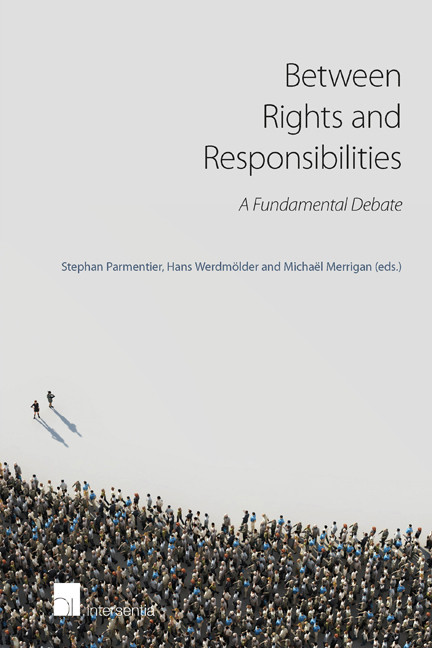Book contents
- Frontmatter
- Foreword
- Contents
- About the Authors
- Introduction: Towards an Integrated Vision of Rights and Responsibilities
- PART I FUNDAMENTAL RIGHTS AND FUNDAMENTAL RESPONSIBILITIES: SETTING THE SCENE
- PART II RIGHTS AND RESPONSIBILITIES IN SPECIFIC CONTEXTS
- Human Rights in a Globalising Economy. Is the Right to Social Protection Qualified by a Duty to Work?
- Human Rights in a Globalising Economy. Rights and Responsibilities of Trade Unions
- Fundamental Rights and Responsibilities within a Multicultural Society
- From Lawless to a Human Rights Approach in the Fight Against Terrorism. The Council of Europe Standards
- Children's Rights at a Dignitarian Horizon of Responsible Parenthood
- Individuals’ Duties in the African Human Rights Protection System. Challenges and Prospects
- Declaration of Human Duties and Responsibilities
Children's Rights at a Dignitarian Horizon of Responsible Parenthood
from PART II - RIGHTS AND RESPONSIBILITIES IN SPECIFIC CONTEXTS
Published online by Cambridge University Press: 22 November 2017
- Frontmatter
- Foreword
- Contents
- About the Authors
- Introduction: Towards an Integrated Vision of Rights and Responsibilities
- PART I FUNDAMENTAL RIGHTS AND FUNDAMENTAL RESPONSIBILITIES: SETTING THE SCENE
- PART II RIGHTS AND RESPONSIBILITIES IN SPECIFIC CONTEXTS
- Human Rights in a Globalising Economy. Is the Right to Social Protection Qualified by a Duty to Work?
- Human Rights in a Globalising Economy. Rights and Responsibilities of Trade Unions
- Fundamental Rights and Responsibilities within a Multicultural Society
- From Lawless to a Human Rights Approach in the Fight Against Terrorism. The Council of Europe Standards
- Children's Rights at a Dignitarian Horizon of Responsible Parenthood
- Individuals’ Duties in the African Human Rights Protection System. Challenges and Prospects
- Declaration of Human Duties and Responsibilities
Summary
‘We have national debates about industrial relations, education, water, nuclear power. But we have no national debates about our most valuable asset, our children and their protection … We still have no national standards for child protection, no federal children's minister, no national policies or legislation, no national definitions, no federal system of children's commissioners, no independent scrutiny of child protection, and no reliable national data.’
Chris Goddard and Joe TucciINTRODUCTION
All over the world, children, especially infants and pre-school children, are treated as the property of their parents rather than as legal subjects, entitled to the empowerment of their parents, to healthy development and to preparation for responsible life, including responsible parenthood. A strong libertarian tradition of formal parental autonomy (that is, autonomy as a legal fiat or fiction, as opposed to real or psychological autonomy) does not seem to leave much room for a child rights based evolution towards a more dignitarian construct of reproductive rights and parental responsibilities. In this chapter, this theme is preliminarily explored and attempts are made for its further development. In section 2, a helicopter view of the theme is presented. In section 3, the concept of responsible parenthood is explored on the basis of a pedagogical model of the principle of the best interests of the child, as well as of an overview of parental responsibilities and related state obligations under the Convention on the Rights of the Child (CRC, 1989).
A HELICOPTER VIEW
LIBERTARIAN AND DIGNITARIAN TRADITIONS
In human rights law, a libertarian and a dignitarian stand or tradition may be discerned. Whereas the former emphasises individual freedoms, especially against state intervention, and formal individual autonomy (negative liberty, individualism), the latter tries to clarify the aspect of duties and responsibilities in relation to rights, and to integrate freedom, equal opportunities and solidarity (justice, or even love) into its concept of human dignity (positive liberty, personal development and global citizenship). Not so much ‘respect’ as a claim against others but the combination of self-respect and respect for others, as a core value or virtue, underlies this concept.
- Type
- Chapter
- Information
- Between Rights and ResponsibilitiesA Fundamental Debate, pp. 157 - 186Publisher: IntersentiaPrint publication year: 2016



